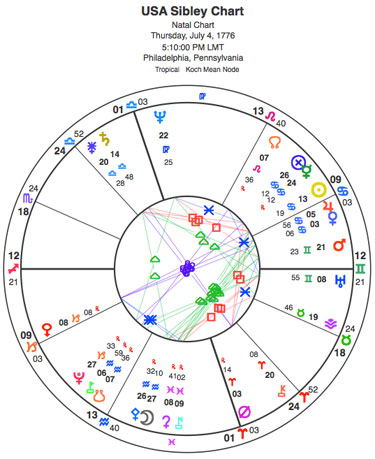http://gop-astrology.blogspot.com

USA Neptune as described by MP evokes the hope of more mature Neptune dreaming/vision for our national collective story
Mary Plumb, Neptune and the Dream in the U.S.
The U.S. Sibly horoscope has Mars at 21º Gemini in the 7th house, square an elevated (closest to the 10th-house cusp) Neptune at 22º Virgo, sign of its detriment.
As a nation, we have a collective storyline that includes both nebulous (or ill-defined) actions or motivations, and a susceptibility to propaganda or seduction, side-by-side with a guileless belief in altruistic action.
~
Thanks To Gerrymandering, Democrats Would Need To Win The Popular Vote By Over 7 Percent To Take Back The House - LINK
As of this writing, every single state except Hawai’i has finalized its vote totals for the 2012 House elections, and Democrats currently lead Republicans by 1,362,351 votes in the overall popular vote total. Democratic House candidates earned 49.15 percent of the popular vote, while Republicans earned only 48.03 percent — meaning that the American people preferred a unified Democratic Congress over the divided Congress it actually got by more than a full percentage point. Nevertheless, thanks largely to partisan gerrymandering, Republicans have a solid House majority in the incoming 113th Congress...
A deeper dive into the vote totals reveals just how firmly gerrymandering entrenched Republican control of the House. If all House members are ranked in order from the Republican members who won by the widest margin down to the Democratic members who won by the widest margins, the 218th member on this list is Congressman-elect Robert Pittenger (R-NC). Thus, Pittenger was the “turning point” member of the incoming House. If every Republican who performed as well or worse than Pittenger had lost their race, Democrats would hold a one vote majority in the incoming House.
Pittenger won his race by more than six percentage points — 51.78 percent to 45.65 percent.
The upshot of this is that if Democrats across the country had performed six percentage points better than they actually did last November, they still would have barely missed capturing a majority in the House of Representatives. In order to take control of the House, Democrats would have needed to win the 2012 election by 7.25 percentage points. That’s significantly more than the Republican margin of victory in the 2010 GOP wave election (6.6 percent), and only slightly less than the margin of victory in the 2006 Democratic wave election (7.9 percent). If Democrats had won in 2012 by the same commanding 7.9 percent margin they achieved in 2006, they would still only have a bare 220-215 seat majority in the incoming House, assuming that these additional votes were distributed evenly throughout the country. That’s how powerful the GOP’s gerrymandered maps are; Democrats can win a Congressional election by nearly 8 points and still barely capture the House.
Unless Democrats in a variety of blue states put in place the sort of mid-cycle redistricting undertaken by Tom Delay in Texas and Democrats in Republican-controlled states push for independent citizen redistricting of the sort enacted by California's Proposition 11, the House is very likely to remain in Republican hands all the way through 2022, when the next district lines will have taken effect following the next census.
The fact that our lives are still controlled by a group of Confederate revanchists in the year 2013 is an entirely artificial construction of arcane rules of governance, principal among them gerrymandering and the filibuster. Without those rules, this country would already be on its way to a post-Reagan, post-silent-majority Renaissance--Barack Obama's personal politics notwithstanding.
No comments:
Post a Comment